Turkey: 86-year-old Greek Man Murdered; Court Rules against ‘Hate Crime’
by Uzay Bulut*
The case concerning the brutal murder of an 86-year-old Greek Christian citizen of Turkey in 2019 has finally concluded. The court ruled against it being considered a hate crime. It also rejected the intervention of Turkey’s Human Rights Association (IHD) in the case.
The victim, Zafir (Zafeirios) Pinaris, lived a desolate life on the island of Imbros (Gökçeada). He was found murdered in his home on May 13, 2019 with his hands and feet tied. He was tortured to death.
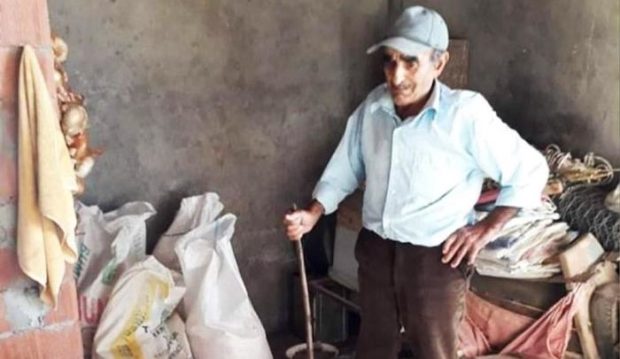
Zafir (Zafeirios) was found murdered in his home on May 13, 2019, with his hands and feet tied. He was tortured to death
The Independent’s Turkish website reported:
The islanders did his daily chores, and he himself hardly left his home. For the first time, he did not open the door to his neighbor who brought food on May 13, 2019. The neighbor who opened the door found the old man on the ground with his hands tied. The gendarme who came to the house evaluated that Pinaris had died 1 day ago and an investigation was started regarding the murder. After 11 days, the operations [investigations] were concluded. Within the scope of the investigation, 8 people were detained. 5 of them were released, and 3 suspects, Erdoğan Baş, Mete Sarı and Kadir Arslan, were arrested. One of the defendants, Erdoğan Baş, died shortly after being imprisoned.
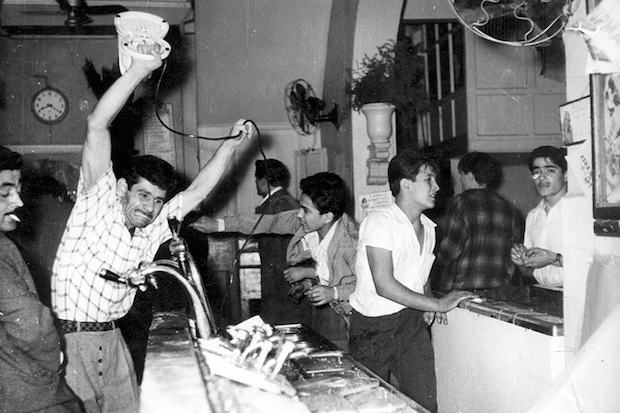
The Turkish Pogrom against the Greeks of Constantinople. September 6-7, 1955
The lawsuit, which went on for a year and a half, concluded on April 7.
In the case, held at the Çanakkale Courthouse, the court sentenced Kadir Arslan, one of the detained defendants, to an aggravated life sentence for murder by design and to 15 years in prison for looting.
While Mete Sarı was acquitted of the charge of murdering Pinaris by design, he was sentenced to 15 years in prison for looting. Arslan and Sarı’s detention was decided to continue. Erdal Baş, who was tried without arrest, was sentenced to 1 year and 6 months for possession of an unlicensed weapon, but was acquitted of concealing the evidence of the crime. Juvenile delinquent A.B. was sentenced to 4 years and 2 months for aiding the looting crime. It was decided that the trials of Erdal Baş and A.B. would continue without arrest.

The Turkish Pogrom against the Greeks of Constantinople. September 6-7, 1955
However, the request for intervention of Turkey’s Human Rights Association (IHD) was rejected by the court. Inci Incesağır, a lawyer with the IHD who followed the case, said the murder was also a hate crime:
The court, however, did not consider it a hate crime. There is an understanding [in Turkey] that ‘If one is Greek, one is definitely very rich and his/her money should belong to “us,” not to the Greek.’ Therefore, we think that this should be considered as a hate murder, but our request for intervention was rejected [by the court].
Incesağır said she believes that Kadir Arslan and Mete Sağır, two of the 5 defendants in the case, directly participated in the crime:
Sarı was acquitted of murder by design. Since our request for intervention was not accepted, we think that the victim’s attorney will appeal.
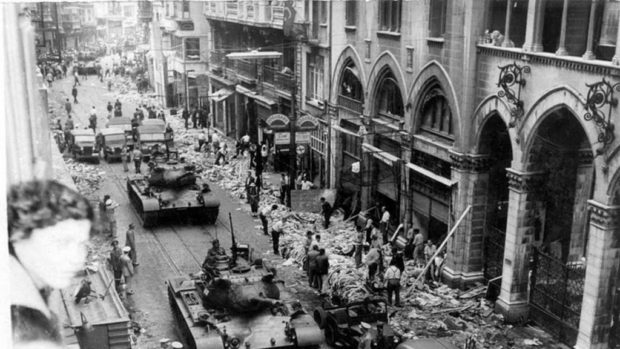
The Turkish Pogrom against the Greeks of Constantinople. September 6-7, 1955
It was not only Pinaris’s right to life that was taken away by Turks. His hometown, the island of Imbros, was also violated and ethnically cleansed of its indigenous Greek population by Turkish authorities. Imbros was a demographically Greek island until pressures against local Christians were accelerated by the Turkish government during the 1960s.
The 1923 Lausanne Treaty, which recognized the borders and independence of Turkey, established a special status – including the right to a Greek local administration – for the then-Greek-populated Aegean islands, Imbros and Tenedos (Bozcaada). According to the treaty, Greek residents were supposed to be protected by the Turkish government.

The Turkish Pogrom against the Greeks of Constantinople. September 6-7, 1955
However, those provisions of the treaty were never honored by Turkey. The island’s Turkification happened in “a detailed and carefully designed process,” said a prominent human rights advocate, Ayse Günaysu. “The sense of security, educational rights, language, and economic well-being of the Greek Christians on that island were all targeted systematically. In 1965, a ‘semi-open prison’ was opened on the island. The inmates were allowed to wander around everywhere on the island, committing violent crimes against the Greek population, such as harassment, rape, arson, attacks on Greek homes, and robbery. In 1991, once the Greek population was reduced to a mere remnant, the prison was closed down. The lands owned by the Greek population and the properties of all Greek foundations began to be confiscated in the 1960s. Greek schools were closed down. The island was then declared a ‘military zone’ in 1970.”

The Turkish Pogrom against the Greeks of Constantinople. September 6-7, 1955
While all these policies were implemented, ethnic Turks were settled on the island. Then in 1970, the name of Imbros was changed to “Gökçeada.” According to Günaysu: “The rapid decrease in the Greek resident population and the equally rapid increase in the number of Muslims/Turks clearly reveal the “population engineering” designed by the Turkish state.”
Read more about the Turkish campaign against Imbros here.
Imbros is not the only location in Turkey that was cleansed of its indigenous Greek population. For decades, Christians and their cultural heritage all across Asia Minor have been targeted by the Turkish government and the country’s many citizens. Between 1914 and 1923, Ottoman Turkey under two successive regimes concluded a systematic campaign of extermination against indigenous Greeks of the region. Armenians and Assyrians were also targeted. In 2007, the International Association of Genocide Scholars recognized the violent campaign as genocide.
But systematic discrimination against non-Muslims continued even after Turkey’s founding. The Civil Servants Law of 1926 made it virtually impossible for non-Muslims to work at state institutions. As a result of this law, thousands lost their jobs. In 1941, Armenian, Assyrian, Greek and Jewish males in Turkey were forced into labor camps. This occured under a policy referred to as the “conscription of the twenty classes”(“yirmi kur’a nafıa askerleri“). They were forced to work under terrible conditions to construct roads and airports. Some lost their lives to disease and other factors.
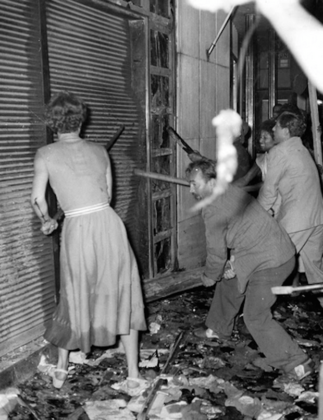
The Turkish Pogrom against the Greeks of Constantinople. September 6-7, 1955
In 1942, the Turkish government enacted the Wealth Tax Law (Varlık Vergisi) in order to remove Armenians, Assyrians, Greeks and Jews from the economy. Those who could not pay the tax were sent to labor camps or deported; their properties were seized by the government.
On September 6-7, 1955, the Greeks of Constantinople/Istanbul were the target of a government-led pogrom; Armenians and Jews were also victimized. Turks attache everything belonging to these minorities: homes, businesses, churches, cemeteries and schools, among others. A British journalist reported that the Greek neighborhoods of Istanbul “looked like the bombed parts of London during the Second World War.” The savagery of the mobs created such an atmosphere of fear that, following the pogrom, tens of thousands of Greeks left Turkey.
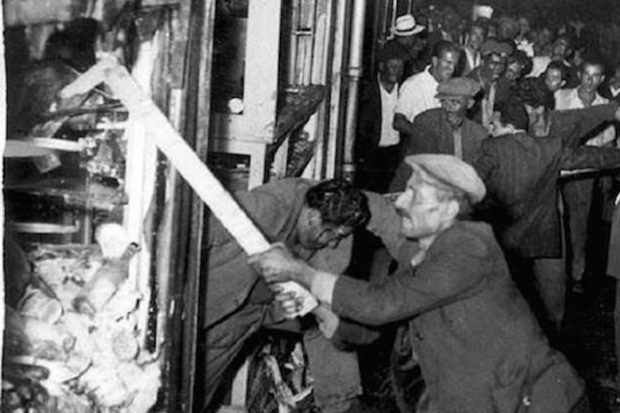
The Turkish Pogrom against the Greeks of Constantinople. September 6-7, 1955
In 1964, Greeks in Constantinople/Istanbul — including the disabled, the elderly and the infirm — became victims of a mass expulsion at the hands of the government. The deportees were given twelve hours to leave Turkey and were only permitted to take 20 kilograms (44 lbs.) of possessions and the equivalent of $20 with them, leaving behind the rest of their property, much of which was then confiscated by the Turkish state and private citizens.
The Turkish news website Bianet reported in 2005:
According to church records, only 1,244 Greeks remain in Turkey. They are nervous. Their religious holidays, rites and ceremonies are [considered as scandalous] incidents. Their lives are under surveillance.
In the same report, Mihail Vasiliadis, Editor-in-Chief of the only remaining Greek-language newspaper in Constantinople/Istanbul, “Apoyevmatini”, said: “We [Greeks in Turkey] have started to go extinct like the Caretta Caretta turtles or northern bald ibis. But unfortunately, the Greeks are seen as more worthless than a turtle, a bird.”

The Turkish Pogrom against the Greeks of Constantinople. September 6-7, 1955
Since the early twentieth century, Turkey has been committing a campaign of annihilation against native Greeks. The latest victim is Zafir Pinaris, an elderly, lone man whose only crime was being Greek. His fate was just like the hundreds of thousands of other Greeks that Turkey has killed or forcibly deported for the same reason.
Uzay Bulut is a Turkish journalist and political analyst formerly based in Ankara.
This story was first published in jihadwatch.org a site that seeks to provoke continuous and increasing outcry wherever and whenever the Sharia’s institutionalized injustices threaten dhimmis (non-Muslims) and women.











0 comments